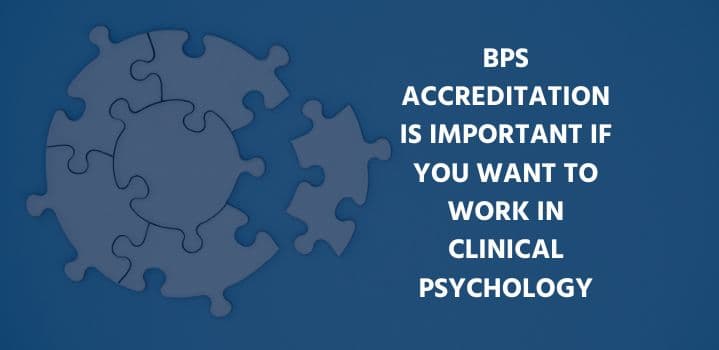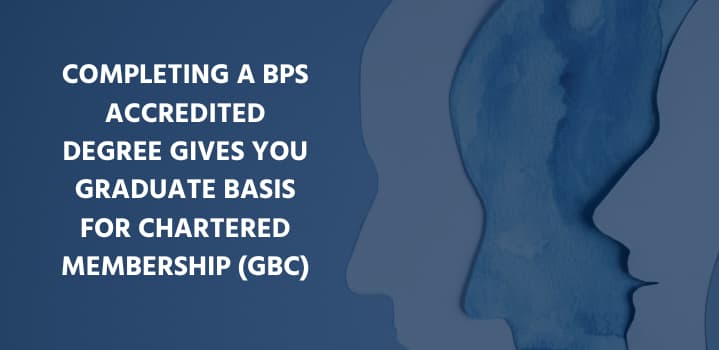Taking a British Psychological Society (BPS) accredited degree or conversion course is essential if you want to train to become a practising clinical psychologist in the UK. Having a BPS accredited degree or conversion MSc is an entry requirement for doctorate-level training courses approved by the Health and Care Professionals Council (HCPC)*.
This ensures that students who progress to postgraduate clinical psychology have covered the requisite subject areas in enough depth.
There are three stages to becoming a clinical psychologist in the UK.
- Stage one- Take a BPS accredited degree or Master’s level conversion course.
- Stage two- Complete training recognised by the HCPC. These programmes combine study with clinical practice. Depending on the specialisation, they can be at masters or doctorate level.
- Stage Three- Register with the HCPC as a practitioner psychologist.
You can search online BPS accredited Psychology courses using the filters on this site.
*The Health and Care Professions Council (HCPC) is an organisation in the United Kingdom that governs health, psychology, and care professions. They maintain the register of licenced practitioners, set professional standards, ensure the quality of instruction and qualification required, and investigate complaints.

Who Are the British Psychological Society (BPS)
The BPS is the representative body for psychologists and psychology within the UK. Their mission is to raise the standard of training and practice in psychology.
Founded in 1902 at University College London, the society gained a Royal Charter in 1965. Between 1987 and 2009, the BPS was the regulator responsible for maintaining the register of psychologists. In 2009, the responsibility passed to the Health and Care Professions Council. The HCPC regulates and maintains the registers of 15 health and care professions.
What Is Required for Graduate Basis for Chartered Membership (GBC)?
For a course to be eligible for BPS accreditation and graduate membership, the syllabus must cover certain areas in sufficient depth and rigour. You can read the accreditation guidelines for education providers (The link opens a new tab)
BPS-accredited degrees must cover the following areas-
- Biological psychology
- Cognitive psychology
- Developmental psychology
- Individual differences
- Social psychology
- Conceptual and historical issues in psychology
- Research methods
- Empirical Project
A conversion course is designed especially for non-psychology graduates. They are intense programmes that cover the learning outcomes required by the BPS in one year compared to over three years on a degree.
Other types of Master’s degrees in psychology do not require BPS accreditation as they focus on specialised areas that are too specific to meet the breadth of areas for BPS accreditation and GBC. Students who take a non-accredited master’s in psychology typically have already completed a BPS accredited bachelor’s degree.
Does a Psychology Master’s Need to Be Accredited?
You only need to take BPS accredited master’s if you do not have a BPS accredited undergraduate degree.
To progress into one of the highly regulated clinical psychology roles, you must complete a course that meets the Graduate Basis for Chartered Membership, either an undergraduate degree or a conversion master’s accredited by the BPS.
BPS accreditation is not a requirement for careers in the wider psychology workforce in non-clinical roles.
Is BPS Membership Required?
You do not need to join the BPS as a student or graduate to hold the GBC. Even though the name “Graduate Basis for Chartered Membership” alludes to a membership of the BPS, it is the degree or conversion course that has been given the accreditation. Once you have graduated from a BPS accredited course, it confers eligibility on the holder to professional psychology training.
Once a person has completed their professional psychology certification and they qualify to practice, they can choose to join the BPS to obtain chartered psychologist status.
BPS Accreditation for International Students?
If you have a non-accredited undergraduate bachelor’s, you need to apply directly to the BPS for the Graduate Basis for Chartered membership. They will assess your qualification against their criteria. Just joining the BPS or gaining their student membership is not enough.
If your existing qualification does not meet the requirements, you would need to take a conversion course before being able to undertake HCPC training.
Options If You Have a Psychology Degree That Is Not BPS Accredited
If you have a non-accredited psychology degree from a UK university and you want to pursue a career in clinical psychology, the first thing you need to do is contact the BPS. They will be able to advise on your situation regarding the Graduate Basis for Chartered Membership.
When an application is made for the GBC membership, the BPS will assess the qualifications held by the applicant as part of the process. If the transcripts show the required learning, the membership will be given, opening up further clinical training options.
If you cannot gain GBC membership, you would need to take a conversion course to pursue further HCPC qualifications in clinical psychology.

